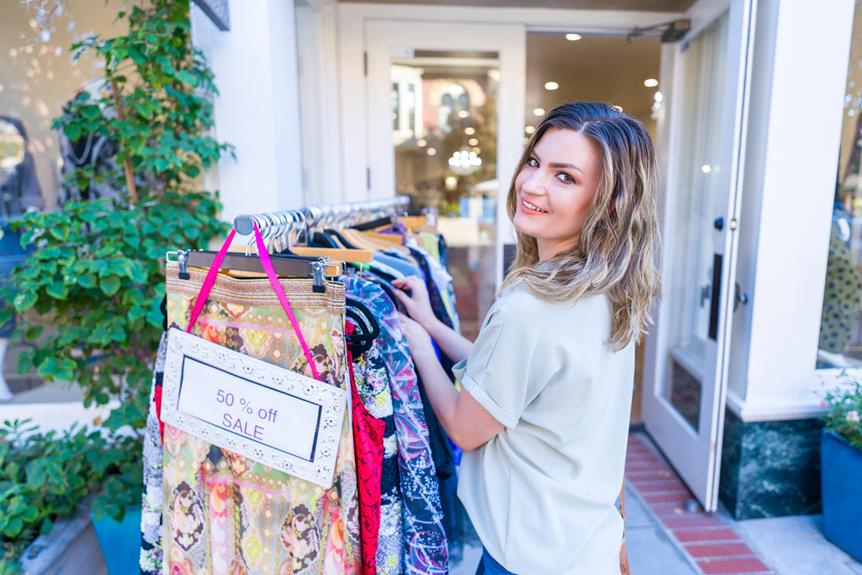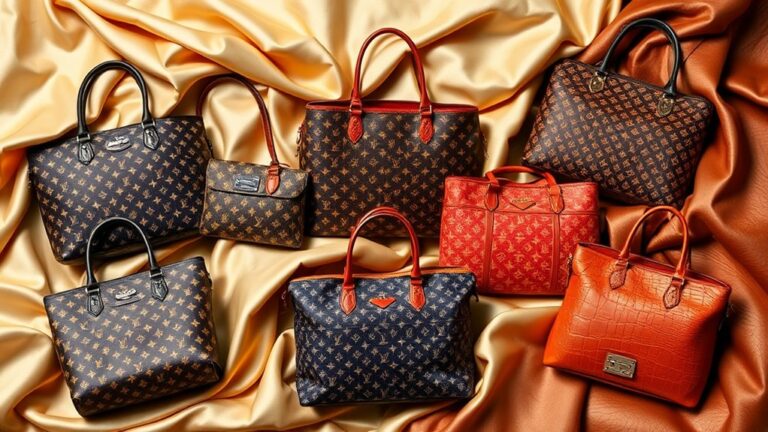Is Glassons Fast Fashion
Glassons is a fast-fashion brand that relies on a business model of trendy, low-cost clothing, primarily for young women. The brand closely monitors consumer behavior to adapt to trends, prioritizing speed and affordability over sustainability and quality. This has led to concerns about environmental degradation and worker exploitation within its supply chain, with a sustainability rating of 4/10 and a "Not Good Enough" rating for worker rights. Glassons' use of animal-derived materials and lack of transparency also raises ethical concerns. With criticism surrounding its fast fashion model, is Glassons doing enough to address these issues and shift towards sustainability.
Glassons Environmental Impact
Glassons' fast fashion model has significant environmental implications, contributing to the alarming rate of overconsumption and degradation worldwide.
The rapid production of low-quality garments is a major concern, resulting in staggering waste levels. In New Zealand alone, approximately 180,000 tonnes of clothing waste are disposed of yearly, with fast fashion being a significant contributor.
Glassons has made some efforts to adopt sustainable materials, such as introducing recycled cotton, but more extensive initiatives are needed to reduce carbon emissions and water consumption.
To improve its sustainability rating, Glassons must prioritize eco-friendly practices and encourage consumers to adopt more sustainable consumption habits, reducing the throwaway culture that contributes to the 85% of textiles ending up in landfills globally.
Labour Conditions and Ethics
The working conditions and labour practices in Glassons' supply chain raise concerns about potential worker exploitation and unfair treatment.
With garment production taking place in countries vulnerable to labour abuse, there is a significant risk of worker rights and safety being compromised.
Specifically, the lack of collective bargaining initiatives and uncertainty about whether minimum wages meet living standards fuel concerns about worker exploitation and unfair labour practices.
Worker Exploitation Concerns
Looking into the manufacturing practices of fast-fashion brands like Glassons, it is concerning to find that despite claims of upholding ethical standards, there is a lack of transparency and evidence supporting worker empowerment initiatives within their supply chain.
Glassons claims to uphold ethical manufacturing standards and audits some suppliers, yet there is no evidence of worker empowerment initiatives such as collective bargaining.
The brand's final production takes place in high-risk labor abuse countries, raising concerns about worker exploitation and rights.
While Glassons pays a minimum wage to workers, there is no assurance that this amount meets the living wage standard necessary for a decent quality of life.
This lack of transparency and commitment to worker empowerment raises concerns about Glassons' ethical sourcing practices.
Unfair Labour Practices
Worker exploitation concerns at Glassons, combined with a lack of transparency and commitment to fair labor practices, raise serious questions about the brand's dedication to upholding labor conditions and ethics.
The company produces garments in high-risk labor abuse countries, sparking concerns about working conditions and potential worker exploitation.
Although Glassons has a Code of Conduct and conducts regular audits, there is no evidence of worker empowerment initiatives like collective bargaining.
The brand has faced criticism for past labor violations and is rated "Not Good Enough" for worker rights.
To address these concerns, Glassons must prioritize ethical sourcing and demonstrate a genuine commitment to protecting worker rights, ensuring that all workers receive a living wage and have access to fair labor practices.
Animal Welfare and Sourcing
Glassons' approach to animal welfare and sourcing raises concerns, particularly regarding its use of animal-derived materials such as wool and leather.
Despite having a policy that prohibits the use of fur, down, and angora, the brand's sourcing of other materials, like exotic animal hair and leather, lacks transparency.
This lack of clarity in its supply chain has led to Glassons being rated "Not Good Enough" for animal welfare.
Animal Derived Materials
The use of animal-derived materials in fashion is a contentious issue, with many consumers increasingly scrutinizing brands for their sourcing practices.
Glassons has made some effort to address this concern by prohibiting the use of fur, down, and angora in its products.
However, the brand's commitment to animal welfare is limited, as it does not actively promote or implement ethical sourcing practices for animal-derived materials.
Glassons' lack of transparency regarding the sourcing of leather, exotic animal hair, and wool raises concerns about the welfare of animals involved in its supply chain.
The brand's "Not Good Enough" rating for animal welfare practices highlights the need for improved traceability and ethical sourcing.
Wool and Leather Use
Despite some efforts to address animal-derived material concerns, the use of wool and leather in Glassons' products remains a pressing issue.
The brand's lack of transparency in its wool sourcing and leather production processes raises concerns about animal welfare and responsible sourcing. Glassons has not demonstrated evidence of ethical sourcing practices for these materials, making it difficult to verify the treatment of animals in its supply chain.
The brand's rating of "Not Good Enough" for animal welfare further highlights the need for improvement. Considering leather alternatives could be a step towards more responsible sourcing practices.
However, without greater transparency and accountability, the use of wool and leather in Glassons' products will continue to raise animal welfare and sourcing concerns.
Glassons Sustainability Efforts
Fast fashion brands are often scrutinized for their environmental impact, and Glassons is no exception. The company has made attempts to implement sustainable initiatives, such as increasing the use of sustainable fabrics, achieving 48% sustainability in products by 2022.
To raise consumer awareness, Glassons has also introduced eco-friendly materials like recycled cotton in some collections. However, despite these efforts, the brand still faces criticism for its fast fashion model that contributes to overconsumption.
- Glassons aims to increase the use of sustainable fabrics in its products.
- The company has introduced eco-friendly materials like recycled cotton in some collections.
- Glassons has been rated "Not Good Enough" for its sustainable practices.
- The brand focuses on three pillars: People, Planet, and Product, but lacks transparency in reporting.
Ethical Concerns and Criticism
Glassons' fast fashion business model has raised several concerns regarding its impact on animal welfare, labor rights, and the environment.
The brand's use of animal-derived materials, such as leather and wool, has sparked concerns about the treatment of animals in its supply chain.
Additionally, allegations of child labor and poor working conditions in Glassons' factories have drawn attention to the need for greater transparency and accountability in the company's operations.
Animal Welfare Concerns
When examining the environmental and social implications of a fashion brand, it is essential to scrutinize its treatment of animals within the supply chain.
Glassons' animal welfare policy lacks robustness, prohibiting only fur, down, and angora while allowing leather, exotic animal hair, and wool without sufficient traceability.
- The brand relies on materials that may involve harm or exploitation of animals without adequate accountability.
- There is no transparency regarding the initial production stages of animal products used in Glassons' collections, raising concerns about potential animal welfare violations.
- Glassons' commitment to animal welfare is undermined by its lack of clear sourcing practices for animal-derived materials.
- The brand's use of animal-derived materials without clear evidence of ethical sourcing raises accusations of animal exploitation.
Labor Rights Issues
Numerous concerns have been raised regarding the treatment of workers within Glassons' supply chain, with the brand facing accusations of neglecting labor rights in countries such as Bangladesh.
The company has been criticized for relying on child labor and paying workers only minimum wage, which is insufficient for living expenses.
Glassons operates in high-risk countries for labor abuse, raising concerns about the actual working conditions faced by garment workers in its supply chain.
Despite conducting audits and partnering with organizations like Oxfam New Zealand, the brand lacks transparency regarding worker rights.
There is no evidence of worker empowerment initiatives, and Glassons has received a low rating for its social compliance measures, indicating significant room for improvement in upholding worker rights throughout its supply chain.
Environmental Impact
The environmental implications of fast fashion have become a pressing concern in recent years, with the textile industry being one of the largest contributors to waste and pollution.
Glassons, as a fast fashion retailer, has faced criticism for its environmental impact. The brand's sustainability rating stands at 4/10, indicating substantial room for improvement in its eco-friendly initiatives and sustainable practices. Critics have accused Glassons of greenwashing, highlighting discrepancies between their sustainability claims and the quality and longevity of their products.
- Glassons contributes to overconsumption and significant textile waste, with approximately 180,000 tonnes of clothing waste disposed of yearly in New Zealand alone.
- The fast fashion model promotes a throwaway culture, with many consumers discarding clothing within a year of purchase.
- Critics argue that Glassons' sustainability claims are not backed by concrete actions.
- Glassons has faced criticism for past labor violations and uses of sweatshops, raising concerns about the ethical implications of its production methods.
Company Ownership Structure
Hallenstein Glasson Holdings Ltd, a publicly listed company on the New Zealand Stock Exchange, has a distinct ownership structure that shapes the operations of its subsidiary, Glassons Australia Ltd.
As a wholly-owned subsidiary, Glassons Australia Ltd operates under the parent company's guidance, influencing its brand evolution and market positioning.
Hallenstein Glasson Holdings Ltd, formed in 1985, has a diversified portfolio of brands, including Glassons and Hallenstein Brothers.
With over 110 stores across the region, the company has established a strong presence in the clothing retail market.
Remarkably, Glassons contributes greatly to its parent company's revenue, generating over 60% of Hallenstein Glasson Holdings Ltd's total income, underscoring its importance in the company's overall strategy.
Fast Fashion Business Model
Glassons' business strategy revolves around a fast fashion model, characterized by an emphasis on trendy, low-cost clothing that caters primarily to young women. This approach prioritizes speed and affordability, often at the expense of sustainability and quality.
A significant aspect of Glassons' fast fashion business model is its reliance on a complex supply chain that enables rapid production and distribution. To maintain this model, the company must closely monitor consumer behavior and adapt to changing trends.
- Glassons maintains a supply chain geared towards rapid production and distribution.
- The company closely monitors consumer behavior to stay ahead of trends.
- By adopting a fast fashion model, Glassons promotes a culture of disposability and overconsumption.
- This approach prioritizes speed and affordability, often at the expense of sustainability and quality.
Glassons Products and Brands
Fast fashion retailers like Glassons thrive on offering a vast array of trendy, affordable clothing items to their target market.
Glassons specializes in women's fast fashion, with a product range that includes skirts, dresses, swimwear, and sandals. These items are offered at low prices, making them appealing to customers seeking affordable fashion options.
Glassons' use of materials such as polyester, cotton, and spandex allows for quick production and low costs, but also contributes to the reduced longevity of their garments.
While Glassons' brand collaborations are not extensively documented, the company's focus on providing on-trend clothing items at affordable prices is a key aspect of its brand identity.
This approach has contributed to Glassons' significant market presence, generating substantial revenue for its parent company.
Comparison With Sustainable Brands
A stark contrast exists between Glassons' fast fashion model and the approach adopted by sustainable brands, which prioritize environmental responsibility and social accountability.
While Glassons has made some efforts to incorporate sustainable practices, its sustainability rating remains low.
Sustainable brands, on the other hand, emphasize transparency, eco-friendly materials, and fair wages.
Glassons' fast fashion model encourages overconsumption and waste, contributing to significant environmental issues.
- Sustainable brands promote transparency in their supply chains and use of organic or recycled fabrics.
- They prioritize fair wages and worker empowerment initiatives, ensuring a living wage across their supply chain.
- Sustainable practices, such as using recycled materials, can positively influence consumer behavior and reduce waste.
- Unlike Glassons, sustainable brands prioritize longevity and responsible consumption to mitigate environmental impacts.
Alternatives to Fast Fashion
Moving beyond the consequences of fast fashion, consumers are increasingly seeking alternatives that promote a more environmentally conscious approach to fashion.
Sustainable alternatives, such as investing in higher-quality garments and supporting local designers, offer a way to reduce reliance on fast fashion retailers like Glassons.
Educational campaigns by organizations like Greenpeace inform consumers about the environmental and social costs of fast fashion, encouraging mindful consumption and support for ethical brands.
Additionally, advocacy for government regulations can hold fast fashion producers accountable for their environmental impact, promoting a shift towards more sustainable practices in the fashion industry.
Final Thoughts
Glassons' fast fashion business model raises significant environmental, social, and ethical concerns. The brand's sustainability efforts, while present, are often overshadowed by the industry's broader issues. Labour conditions, animal welfare, and environmental impact remain pressing concerns. As consumers increasingly prioritize sustainability, Glassons and similar brands must adapt to meet these expectations. Ultimately, the brand's approach to fast fashion necessitates a critical evaluation of its practices and their far-reaching consequences. Transparency and accountability are essential in mitigating these issues.







